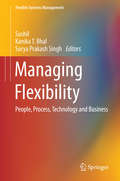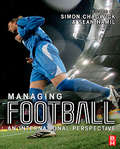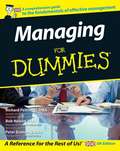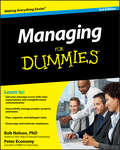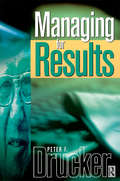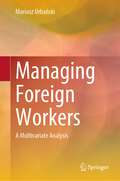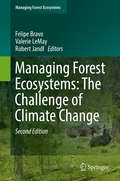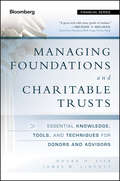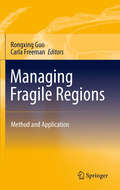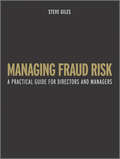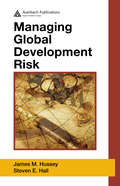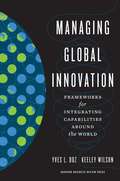- Table View
- List View
Managing Flexibility
by Sushil Kanika T. Bhal Surya Prakash SinghThis edited book provides a conceptual framework of managing flexibility in the areas of people, process, technology and business supported by researches/case applications in various types of flexibilities in business. The book is organized into following five parts: (i) Managing Flexibility; (ii) People Flexibility; (iii) Process Flexibility; (iv) Flexibility in Technology and Innovation Management; and (v) Business Flexibility. Managing flexibility at the level of people, process, technology and business encompasses the requirements of both choice and speed. The need for managing flexibility is growing to cope with the developments and challenges in the global business environment. This can be seen from reactive as well as proactive perspectives. Flexibility is a major dimension of business excellence and deals with a paradoxical view point such as stability and dynamism, continuity and change, centralization and decentralization, and so on. It needs to be managed at the levels of people, process, technology and various business functions and it is important to create flexibility at the level of people to create and manage flexibility in processes and technologies in order to support flexible business requirements.
Managing Football
by Simon Chadwick Sean HamilManaging Football is the first book to directly respond to the rapid managerial, commercial and global development of the sport and offers a thorough analysis of how the football industry can meet the challenges that flow from these developments. Expertly edited by two well known specialists in football business management, it draws together the work of a world-class contributor team to form a comprehensive analysis of the most important issues facing the managers of football businesses across the world. The cutting edge analysis examines all the important business challenges in the football industry and the management of football businesses and covers all of the key football markets including England, Spain, France, Italy, Germany, Australia, North America, China, South Africa, South Korea, the Netherlands & Belgium, and Mexico. Managing Football is simply a must-read for anyone studying or working in football business management and is set to be an important landmark in this rapidly moving and globally expansive field.
Managing For Dummies
by Peter Economy Bob Nelson Richard PettingerIf you're having trouble motivating your employees, need to resolve a conflict, or want to learn how to better monitor your employees' performance, this straight-forward guide will take you step by step through every aspect of managing. Packed with expert advice on team-building, communication skills, identifying talented employees, and letting go of staff, Managing for Dummies takes the stress out of what can be an intimidating and high-pressured job.The book will be adapted from the current US edition of Managing for Dummies. Existing content will be revised to reflect essential UK information including:UK-specific case studies, including references to recognisable UK businessesUK business practice, including ethics, employee and employers rights and responsibilities, hiring and firing - with reference to UK lawUK websitesUK financial information
Managing For Dummies, 3rd Edition
by Peter Economy Bob NelsonThe fast and easy way to learn how to manage people, projects, and teams Being a manager can be an intimidating and challenging task. Managing involves teaching new skills to employees, helping land a new customer, accomplishing an important assignment, increasing performance, and much more. The process of management can be very challenging at times, but it can also bring you a sense of fulfillment that you never imagined possible. Managing For Dummies, 3rd Edition is perfect for all levels of managers. This clearly written, easy-to-understand guide gives you practical advice on the most important aspects of managing, such as delegating as opposed to ordering, improving employees' performances, getting your message across, understanding ethics and office policies, team building and collaboration, and much more. Tips and advice for new and experienced managers All-new chapters on employee encouragement and corporate social responsibility Guidance on managing employees by leveraging the power of the Internet Managing in today's lightning-speed business world requires that you have the latest information and techniques for getting the job done. Managing For Dummies, 3rd Edition provides you with straightforward advice and up-to-the-minute strategies for dealing with anything that comes your way.
Managing For Results: Economic Tasks And Risk-taking Decisions
by Peter DruckerManaging for Results demonstrates Drucker's particular genius for breaking through conventional outlooks and opening up new perspectives for ultimate profits in the world of business. What must be done to make the organization perform, prosper and grow - what the executive, the maker of decisions, must do to move the enterprise forward - is the subject of this book. It will be of great value to students of management as well as executives in industry and commerce, and it deals skilfully and perceptively with economic tasks which every business has to tackle in order to achieve sound performance and economic results.
Managing Foreign Workers: A Multivariate Analysis
by Mariusz UrbańskiThis book serves as an essential guide to understanding and effectively managing multiculturalism and diversity in the workplace. The book discusses the growing trend of hiring foreign workers by companies and the need to appropriately manage a diverse workforce. It addresses the research gap in the existing literature, which lacks detailed quantitative analyses on the employment of immigrants in business entities operating in Poland. By conducting an extensive survey of enterprises in Poland, the United Kingdom and the United Arab Emirates, the book provides a comprehensive analysis of managing employees in a multicultural work environment. It offers practical recommendations for improving employee motivation and performance while also contributing to the theory of management and quality sciences. This book is a valuable resource for anyone interested in managing a diverse workforce, and it provides a deeper understanding of the complex issues involved in managing foreign workers in a multicultural work environment.
Managing Forest Ecosystems: The Challenge of Climate Change
by Robert Jandl Felipe Bravo Valerie LemayClimate change shaped the political agenda during the last decade with three issues as hot topics: commonly making the headlines: carbon budgets, impact and mitigation of climate change. Given the significant role that forests play in the climate system - as sources, sinks, and through carbon trading - this book update the current scientific evidences on the relationships between climate, forest resources and forest management practices around the world. By including the forest scientists' expertise from around the world, the book presents and updates a depth analysis of the current knowledge, and a series of case studies focused on the biological and the economic impacts of climate change in forest ecosystems in Africa, Asia, Europe and North and South America. The book will form a valuable resource for researchers and advanced students dealing with sustainable forestry, climate change issues and the effects of climate change on natural resource management.
Managing Foundations and Charitable Trusts
by James W. Lintott Roger D. SilkThe insider's guide to charitable organizations for donors and their advisors Do you know when to use a private foundation, a donor-advised fund, or a charitable remainder trust or other charitable vehicle? Do you know the different tax benefits, limitations, and control rules for each alternative? Do you have an appropriate investment policy for your endowed charities? Do you have a rubric for avoiding fraud? Do you know what to look for to make sure that your charitable donations don't do the opposite of what you intend? In Managing Foundations and Charitable Trusts, Roger D. Silk and James W. Lintott provide a comprehensive guide for charitable donors and their advisers. Additional topics include: Foundation Governance When to seek additional professional help When and how to turn a CRT interest into cash Key tax issues Creating a legacy Why tax planning is so difficult, and how to approach it Straightforward and authoritative, Managing Foundations and Charitable Trusts is a handy, easy-to-read guide that all donors and their advisors will want to keep on hand.
Managing Fragile Regions
by Rongxing Guo Carla FreemanThis book gathers the work of leading scholars from several disciplines on fragile regions, especially those regions seeking to preserve, strengthen or create processes to restore or reestablish security and effective social and economic management. It tackles the multifarious issues that shape and affect fragile regions, drawing upon a wide range of intellectual and methodological approaches, including such fields as area studies, natural resource science, biology, environmental and resource economics and management, and political economy. The volume brings together the perspectives of a diverse group of contributors from Australia, China, Hong Kong, Indonesia, Japan, South Korea, and the United States. Managing Fragile Regions: Method and Application addresses a variety of factors - natural, political, administrative, legislative, economic, social, and cultural - and examines how they exert influences on the operational mechanisms of fragile regions, especially in the contexts of peace and security, economic development, and environmental management. The volume's nine chapters cover a wide range of examples of fragile regions and their challenges. It will be of interest and utility to practitioners and policy-makers engaged in disaster management and post-disaster reconstruction. Students, researchers, and other professionals involved in resource management, regional science, and environmental science will also find it valuable reading.
Managing Fraud Risk
by Steve GilesA strategic, practical, cost-effective approach to fraud preventionIn troubled economic times, the risk of fraud and financial crime increases. In our post credit crunch environment, new laws and tougher penalties for financial crime mean that if you are in business, you have a responsibility to help fight fraud.However, to design effective, proportionate fraud controls for your business, you need a complete picture of all the risks. Managing Fraud Risk shows you where to look for fraud, setting out a route-map for finding and fighting fraud risks in your business, with the practical, strategic advice you need.Combining the latest theory with forensic risk analysis, this book reveals how you can provide assurance to your Board and stakeholders. Practical examples are used to clearly show cost-effective techniques for preventing and detecting business fraud. An innovative fraud awareness quiz enables you to easily apply the theories and principles.Answers questions such as: Who commits more fraud: men or women? How many of your employees are prepared to falsify documents?Essential information to ensure your procedures are sufficient to meet compliance with new international legislation increasing the liability of directors and managers in cases of fraud and corruptionTakes a new perspective from the point of view of business risk, making it unique to other texts that take only an auditing, investigative, or specialist approachThis route-map is essential reading to help you navigate the complex landscape of business fraud.
Managing Front Office Operations
by Michael L. KasavanaThe tenth edition features several new sections related to the impact of technology on hotel operations, including information on social media platforms, mobile services, mobile device connectivity issues guests may experience in hotels, mobile payments, and how the Internet of Things will affect guest service. New material has been added on key cards and keyless entry technology. In addition, the section on income statements has been revised to reflect the most recent edition of the Uniform System of Accounts for the Lodging Industry.
Managing Future Challenges for Safety: Demographic Change, Digitalisation and Complexity in the 2030s (SpringerBriefs in Applied Sciences and Technology)
by Corinne Bieder Hervé Laroche Jesús Villena-LópezThis open access book addresses the future of work and industry by 2040—a core interest for many disciplines inspiring a strong momentum for employment and training within the industrial world. The future of industrial safety in terms of technological risk-management, although of obvious concern to international actors in various industries, has been quite sparsely addressed. This brief reflects the viewpoints of experts who come from different academic disciplines and various sectors such as oil and gas, energy, transportation, and the digital and even the military worlds, as expressed in debates and discussions during a two-day international seminar. The contributors address such questions as:What influence will ageing and lack of digital skills in the workforce of the occidental world have on safety culture?What are the likely impacts of big data, artificial intelligence and autonomous technologies on decision-making, and on the roles and responsibilities of individual actors and whole organizations?What role have human beings in a world of accelerating changes?What effects will societal concerns and the entrance of new players have on technological risk management and governance?Managing Future Challenges for Safety will interest and influence researchers considering the future effects of a number of currently developing technologies and their practitioner counterparts working in industry and regulation.
Managing Future Enterprise: Staying Ahead Of The Curve With Symbiotic Value Networks (Springerbriefs In Business Ser.)
by Friedrich GlaunerThis book explores new ways for companies to sustain their success, by means of viable business models and a values-driven culture. The point of departure is a value proposition designed to last, and grounded in the values espoused and actively practiced by the organization. These values are in turn the product of a values creation process, which is essential to any business trying to ensure its viability in the long run. A concise step-by-step process explains how this process can be introduced to keep companies competitive for and in the future.In subsequent chapters, the book describes key challenges for modern management, introduces a paradigm of sustainable management, and presents roadmaps to future viability and axioms of viable business management. Active practitioners in executive and operational management roles, research and development, innovation management, human resources, sustainability, or process management will benefit from this volume. Given its scope of coverage, the book offers a valuable resource for lecturers and students in business management, economics, law, and sustainability-related degree courses.
Managing Generation Z: Motivation, Engagement and Loyalty (Routledge Open Business and Economics)
by Agnieszka Niemczynowicz Radosław Antoni Kycia Joanna NieżurawskaGeneration Z (Gen Z) is the young generation born between the mid-1990s and 2010s. They are now entering the market and starting their first jobs. Therefore, managers must shape the company workplace environment to encourage young employees to work efficiently and connect their future with the company. Only then will both managers and employees share mutual satisfaction from collaboration and aim at the common target, which should be the prosperity of the company. This book presents research results and techniques for analysing the working expectations and needs of Gen Z. The analyses were made in various countries in Europe: The Czech Republic, Latvia, Poland, and Portugal. The book contains chapters that present the analysis results and technical chapters that outline modern methods of analysis of management data, including tutorial chapters on machine learning, which currently makes a strong appearance in research in various disciplines. This volume will be of interest to researchers, academics, practitioners, and students in the fields of management studies, research methods, and human resource management.
Managing Geographic Information Systems, Second Edition
by Jeffrey Pinto Nancy ObermeyerNow in a fully revised and expanded second edition, this widely adopted text and practical reference addresses all aspects of developing and using geographic information systems (GIS) within an organization. Coverage includes the role of the GIS professional, how geographic information fits into broader management information systems, the use of GIS in strategic planning, and ways to navigate the organizational processes that support or inhibit the success of GIS implementation. All chapters retained from the prior edition have been thoroughly updated to reflect significant technological, empirical, and conceptual advances, as well as the changing contexts of GIS use. New chapters discuss organizational politics, metadata, legal issues, and GIS ethics.
Managing Global Development Risk
by Steven E. Hall James M. HusseyWhile global sourcing has expanded dramatically in terms of activities, consistent challenges remain for organizations that choose such a business decision. These challenges include maximizing the opportunity afforded by globalization, fully realizing potential gains, and managing the risks inherent to global development. In addition, while companies continue to start or expand their use of global resources, little is being done to help project managers, business analysts, architects, and others succeed in this new environment. Built upon real-world experiences, Managing Global Development Risk provides the tools, techniques, and knowledge necessary to achieve project success with offshore resources. By reading and utilizing the templates within this book, you will acquire: Knowledge of project management principles and their application, Understanding of software development processes and their application , Insight into the diverse personalities within your global development team and the appropriate management and communications style to achieve success. Awareness of cultural issues and mannerisms that will enhance your ability to guide your team To fully realize the benefits of global development, a proper mix of local and offshore resources is essential. This book is an important tool that can help you gain the necessary competency and expand your skills in this critical area.
Managing Global Innovation
by Keeley Wilson Yves L. DozThe key to bridging your global innovation gapIn today's global economy, it would be short-sighted to rely solely on local resources for new-product innovations. Instead, knowledge and activity critical to innovation most likely lie outside your company's home territories-sometimes far outside. And this distance makes it harder than ever to obtain and integrate these resources, eating away at your competitive edge.How to tackle this challenge? In Managing Global Innovation, INSEAD's Yves L. Doz and Keeley Wilson show you how to build and leverage a global innovation network. Drawing on extensive research and real-life company examples, they walk you through a set of practical frameworks for acquiring and integrating innovation-critical knowledge from multiple sources. You'll learn to optimize your innovation footprint, improve communication and receptivity, and enhance collaboration in order to succeed on a global scale.Based on in-depth research within more than three dozen corporations-including Citibank, Essilor, GE, GlaxoSmithKline, HP Labs, HP Singapore, Nokia, Novartis, Shiseido, Siemens, Snecma, Synopsys, and Xerox-this book bridges theory and practice.Managing Global Innovation gives you the tools to harness critical expertise from around the globe-and channel it into your innovation programs.
Managing Global Innovation 1. The Innovation Challenge
by Keeley Wilson Yves L. DozManaging Global Innovation is an 8-chapter book written by Yves L. Doz and Keeley Wilson of INSEAD and published in 2012 by Harvard Business Review Press. In today's global economy, existing knowledge is the catalyst for innovation, but gathering and using this knowledge depends on global factors which can create barriers to access. The authors provide a practical framework for the successful management of knowledge and innovation by optimizing the "innovation footprint," a framework designed to improve communication and receptivity and facilitate collaboration. The book is divided into four parts that address both theory and practice at each stage of the framework as well as the inherent challenges to innovation. The authors' detailed, practical guide for building and leveraging a global innovation network is based on extensive field research conducted worldwide. Chapter 1, The Innovation Challenge (20 pages), examines the challenges that companies face when trying to develop global innovation competencies. While the traditional model of innovation was formerly centered on a company's home market with new developments being sent to other markets, today's economy requires that innovation derive from global sources. The authors summarize the results of their joint survey with Booz & Company and highlight the necessary steps that companies must take to develop knowledge diversification and dispersion. The authors explain why Essilor and Tata Communications exemplify companies with successfully integrated innovation models.
Managing Global Innovation 2. The Optimized Footprint
by Keeley Wilson Yves L. DozManaging Global Innovation is an 8-chapter book written by Yves L. Doz and Keeley Wilson of INSEAD and published in 2012 by Harvard Business Review Press. In today's global economy, existing knowledge is the catalyst for innovation, but gathering and using this knowledge depends on global factors which can create barriers to access. The authors provide a practical framework for the successful management of knowledge and innovation by optimizing the "innovation footprint," a framework designed to improve communication and receptivity and facilitate collaboration. The book is divided into four parts that address both theory and practice at each stage of the framework as well as the inherent challenges to innovation. The authors' detailed, practical guide for building and leveraging a global innovation network is based on extensive field research conducted worldwide. Chapter 2, The Optimized Footprint (30 pages), provides a framework for how a company can create an agile and flexible innovation footprint. First, the authors explore the traditional brick-and-mortar model and the inherent difficulties of relying on physical location. The authors posit that a company's "innovation footprint" should maximize speed and efficiency by balancing location with alternative approaches. They examine three alternative approaches: experiencing in a specific location, foraying via short-term knowledge gathering, and attracting the critical knowledge. The authors define different types of knowledge and explore which alternative approach is best suited to each knowledge type. The chapter includes a real-world corporate examples, including HP Labs India, SNECMA, and Nokia.
Managing Global Innovation 3. How a Site Creates Value and Why the Size of the Network Matters
by Keeley Wilson Yves L. DozManaging Global Innovation is an 8-chapter book written by Yves L. Doz and Keeley Wilson of INSEAD and published in 2012 by Harvard Business Review Press. In today's global economy, existing knowledge is the catalyst for innovation, but gathering and using this knowledge depends on global factors which can create barriers to access. The authors provide a practical framework for the successful management of knowledge and innovation by optimizing the "innovation footprint," a framework designed to improve communication and receptivity and facilitate collaboration. The book is divided into four parts that address both theory and practice at each stage of the framework as well as the inherent challenges to innovation. The authors' detailed, practical guide for building and leveraging a global innovation network is based on extensive field research conducted worldwide. In Chapter 3, How a Site Creates Value and Why the Size of the Network Matters (35 pages), the authors discuss the challenge of creating an optimized innovation footprint where a company maintains individual sites that add value to the innovation process but do not exceed their own operational costs. The authors present a model for evaluating individual sites based on the type of value the sites create: substitution, complementarity, or discovery.. Real-world examples of various types include GE in India, Novartis, and Fuji Xerox. The authors then explore how to determine the optimal footprint size based on company and knowledge factors, including strategic direction, organizational capability, and corporate culture.
Managing Global Innovation 4. The Barriers to Integration
by Keeley Wilson Yves L. DozManaging Global Innovation is an 8-chapter book written by Yves L. Doz and Keeley Wilson of INSEAD and published in 2012 by Harvard Business Review Press. In today's global economy, existing knowledge is the catalyst for innovation, but gathering and using this knowledge depends on global factors which can create barriers to access. The authors provide a practical framework for the successful management of knowledge and innovation by optimizing the "innovation footprint," a framework designed to improve communication and receptivity and facilitate collaboration. The book is divided into four parts that address both theory and practice at each stage of the framework as well as the inherent challenges to innovation. The authors' detailed, practical guide for building and leveraging a global innovation network is based on extensive field research conducted worldwide. In Chapter 4, The Barriers to Integration (13 pages), the authors examine how a company's capability of absorbing new knowledge is critical in converting knowledge to successful innovation. There is an in-depth look at common challenges companies face: a lack of receptivity to new knowledge, inadequate connections between IT system and people, and transferring and integrating complex knowledge. The authors also explore the importance of a culture that enables exchange and shared contributions. Without an open culture, a company can suffer from centralized control, a lack of trust, or internal competition, all of which impede shared work.
Managing Global Innovation 5. Improving Receptivity and Communication
by Keeley Wilson Yves L. DozManaging Global Innovation is an 8-chapter book written by Yves L. Doz and Keeley Wilson of INSEAD and published in 2012 by Harvard Business Review Press. In today's global economy, existing knowledge is the catalyst for innovation, but gathering and using this knowledge depends on global factors which can create barriers to access. The authors provide a practical framework for the successful management of knowledge and innovation by optimizing the "innovation footprint," a framework designed to improve communication and receptivity and facilitate collaboration. The book is divided into four parts that address both theory and practice at each stage of the framework as well as the inherent challenges to innovation. The authors' detailed, practical guide for building and leveraging a global innovation network is based on extensive field research conducted worldwide. Chapter 5, Improving Receptivity and Communication (29 pages), presents solutions that address the barriers to integration and help companies develop strategies for the transfer and integration of knowledge. The authors present various methods of facilitating communication and receptivity. Global innovation relies on the openness of a company's culture, as several examples demonstrate: Xerox created knowledge tools to promote cultural change; Citibank and Synopsis improved connections between different locations and cultures by enabling data sharing and managing technology. Overcoming contextual differences such as national languages, professional cultures, and expected behaviors is addressed by creating a common language - or shared framework for innovation - as shown by how Siemens developed a design center in Asia. Finally, the authors examine the challenge of leveraging complex knowledge with an in-depth look at the role of experienced and insightful "cosmopolitan" managers, with multiple examples.
Managing Global Innovation 6. Organizing for Global Innovation Projects
by Keeley Wilson Yves L. DozManaging Global Innovation is an 8-chapter book written by Yves L. Doz and Keeley Wilson of INSEAD and published in 2012 by Harvard Business Review Press. In today's global economy, existing knowledge is the catalyst for innovation, but gathering and using this knowledge depends on global factors which can create barriers to access. The authors provide a practical framework for the successful management of knowledge and innovation by optimizing the "innovation footprint," a framework designed to improve communication and receptivity and facilitate collaboration. The book is divided into four parts that address both theory and practice at each stage of the framework as well as the inherent challenges to innovation. The authors' detailed, practical guide for building and leveraging a global innovation network is based on extensive field research conducted worldwide. In Chapter 6, Organizing for Global Innovation Projects (31 pages), the authors present a three-stage process of identification, definition, and delivery to manage successful global innovation as well as the requirements for embarking on such an effort. Innovation prerequisites include corporate stability, trust between all teams, a shared context, a plan for personal interactions, and adequate planning time. The authors examine each stage of the global project life cycle and a guideline for managing each in table form. The chapter includes several examples of corporate projects as well as a decision tree for structuring and managing global projects.
Managing Global Innovation 7. Collaborative Innovation
by Keeley Wilson Yves L. DozManaging Global Innovation is an 8-chapter book written by Yves L. Doz and Keeley Wilson of INSEAD and published in 2012 by Harvard Business Review Press. In today's global economy, existing knowledge is the catalyst for innovation, but gathering and using this knowledge depends on global factors which can create barriers to access. The authors provide a practical framework for the successful management of knowledge and innovation by optimizing the "innovation footprint," a framework designed to improve communication and receptivity and facilitate collaboration. The book is divided into four parts that address both theory and practice at each stage of the framework as well as the inherent challenges to innovation. The authors' detailed, practical guide for building and leveraging a global innovation network is based on extensive field research conducted worldwide. Chapter 7, Collaborative Innovation (30 pages), addresses the strategy of working with a local partner instead of creating a local presence. First, the authors discuss the differences in collaborating throughout each phase of the global project life cycle. In describing the identification phase, the authors identify factors to consider when choosing a partner. Next, they explain why a more closed approach is appropriate for the definition and delivery phases and discuss critical partnership issues. Last, he authors explore a fourth phase of the project life cycle which involves the distribution or diffusion of the innovation. Real-world examples include IMB, Boeing, and Intel.
Managing Global Innovation 8. Globally Integrated Innovation
by Keeley Wilson Yves L. DozManaging Global Innovation is an 8-chapter book written by Yves L. Doz and Keeley Wilson of INSEAD and published in 2012 by Harvard Business Review Press. In today's global economy, existing knowledge is the catalyst for innovation, but gathering and using this knowledge depends on global factors which can create barriers to access. The authors provide a practical framework for the successful management of knowledge and innovation by optimizing the "innovation footprint," a framework designed to improve communication and receptivity and facilitate collaboration. The book is divided into four parts that address both theory and practice at each stage of the framework as well as the inherent challenges to innovation. The authors' detailed, practical guide for building and leveraging a global innovation network is based on extensive field research conducted worldwide. The eighth and final chapter, Globally Integrated Innovation (10 pages), offers a practical action plan that highlights key activities for managers and top executives as they begin to implement a global innovation initiative. To optimize the innovation footprint, the authors advise managers to identify knowledge requirements and build or reconfigure an innovation network. For improved receptivity and communication, the authors guide managers in building a communication network, develop cosmopolitan managers, and build a culture of trust. Finally, the authors advise managers to optimize collaboration by managing global projects and finding collaborative partners.
